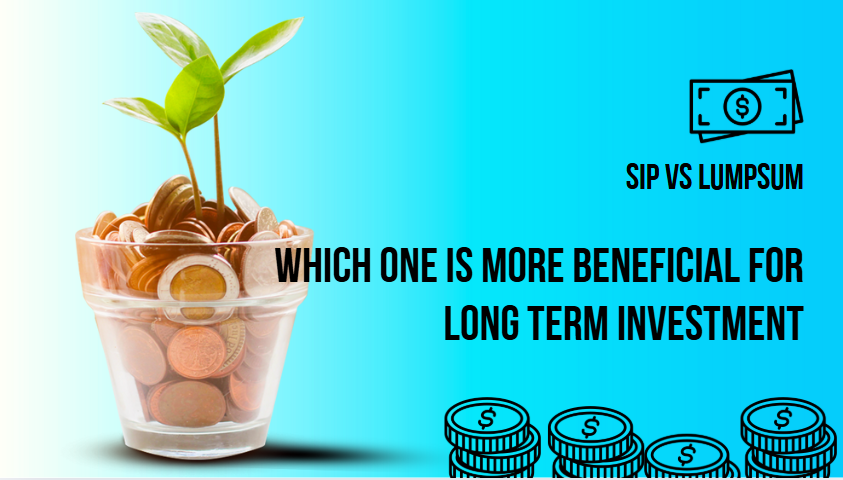- SIP vs Lumpsum: Which is Better for Long-Term Investment?
- What is SIP?
- Key Benefits of SIP:
- What is Lumpsum Investment?
- Key Benefits of Lumpsum:
- SIP vs Lumpsum: A Head-to-Head Comparison
- Now the point is which One is Better for Long-Term Investment?
- The Hybrid Approach: Best of Both Worlds
- Final Thoughts
- 📢 Pro Tip:
SIP vs Lumpsum: Which is Better for Long-Term Investment?
Well, when you think about long-term wealth creation, there are mainly two common investment strategies often come up in your mind: Systematic Investment Plans (SIP) and Lumpsum Investments. Mostly people think about which one is better for long term investment. Here we are going to make it simple for you to understand and decide. Both have their own advantages, and choosing the right one can significantly impact your future financial goals. Let’s dive deep into the comparison to see which one is better for long term investment.
What is SIP?
A Systematic Investment Plan (SIP) is a method of investing a fixed amount of money at regular intervals (monthly, quarterly, etc.) into stocks, mutual funds or any other investment instrument. It encourages disciplined investing and helps mitigate the effects of market volatility through rupee cost averaging.
Key Benefits of SIP:
- Disciplined Investing: Promotes regular saving and investment habits.
- Rupee Cost Averaging: Following SIP technique will buy more units when the market is on correction phase and less when it’s high, which helps reducing average buying cost price over time.
- Compounding Effect: While doing Long-term SIPs can generate a significant wealth due to the power of compounding.
- Convenience: Ideal for those people who are employed/ salaried individuals or those with a steady income stream.
- Lower Risk Exposure: It helps to reduce the impact of timing the market.
What is Lumpsum Investment?
Lumpsum Investment means while you are investing a large amount of money at one time. This approach is usually applicable for an investor who has spare funds available—such as a bonus, any pension amount maturity, or sale of property.
Key Benefits of Lumpsum:
- Immediate Capital Deployment: Putting one time a large amount of money starts earning returns right away.
- Potentially Higher Returns: When markets are trending upward, investing early on button can produce better long-term returns.
- Suitable for Windfalls: It helps to utilize idle funds efficiently.
SIP vs Lumpsum: A Head-to-Head Comparison
| Feature | SIP | Lumpsum |
| Investment Method | Regular, periodic | One-time, large amount |
| Market Timing Risk | Low | High |
| Ideal For | Salaried/steady income | Investors with spare funds |
| Volatility Management | Better (cost averaging) | Riskier in volatile markets |
| Flexibility | High | Low |
| Returns in Bull Market | May be poor | Can outperform |
| Emotional Bias Control | Strong | Weaker (timing anxiety) |
Now the point is which One is Better for Long-Term Investment?
There’s no one-size-fits-all answer. When the question is about the better option, it depends on your personal financial situation, market conditions, and risk maximum you can tolerate.
📈 Choose SIP if:
- You have a steady income source, e.g. salary.
- You want to avoid timing the market.
- You’re just starting your investment journey.
- You prefer a more disciplined and less volatile approach.
💼 Choose Lumpsum if:
- You have a large amount of idle capital which you can put irrespective of market condition and volatility.
- You’re confident in market conditions (e.g., during a market correction). Though it is always hard to find out the top and button of the market.
- Your goal is to maximize compounding value from day one.
The Hybrid Approach: Best of Both Worlds
There are many seasoned investors who use a hybrid strategy, combining SIPs in normal market condition while with occasional lumpsum investments during market dips. This allows them to benefit from both averaging and market opportunities. To achieve this, you should always have surplus fund available.
Final Thoughts
Both SIP and lumpsum investments have a place in a sound financial plan. If your focus is for long-term goals like retirement, children’s education, or wealth creation, the most important factor is to start early and stay consistent be it any market conditions.
Rather than obsessing over which strategy is superior, focus on your financial goals, risk profile, and investment discipline. If needed, consult a financial advisor to help craft a personalized plan.
📢 Pro Tip:
Regardless of the method you choose, ensure your investments align with your risk appetite and long-term objectives.

Leave a Reply